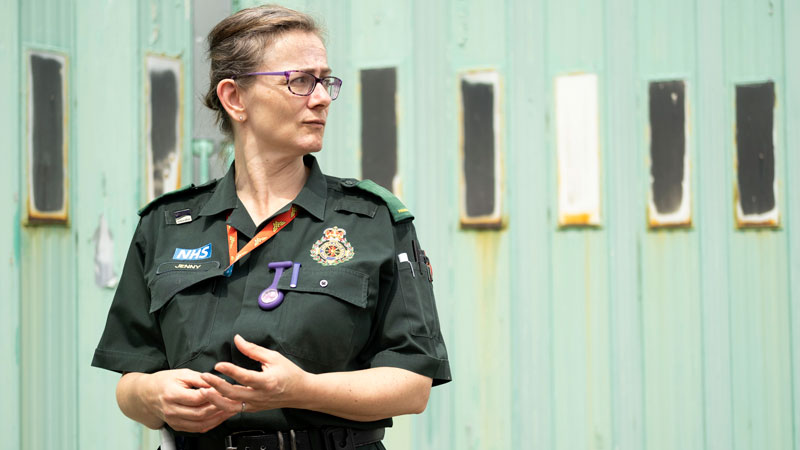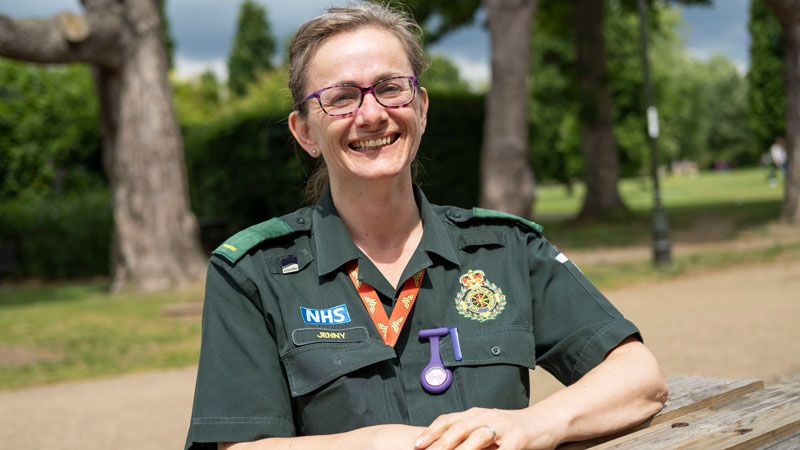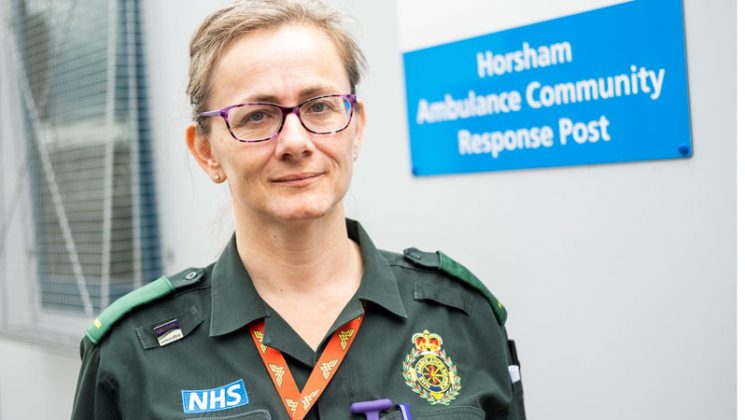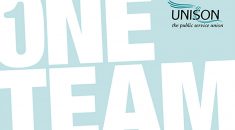Images: Jess Hurd
It could be a scene out of a horror film or a psycho-thriller. In the small hours, an ambulance crew answers a call to a young man whose hand is bleeding heavily. The female paramedic approaches him and offers assistance. He’s agitated, but she coaxes him into the back of the ambulance to treat the wound.
Suddenly the man snaps, starts growling like an animal and attacks her. She pulls herself free and, as the stranger starts tearing the vehicle apart, the two ambulance workers flee for their lives.
Unfortunately, this incident is all too real. It happened.
And it’s the kind of horrific situation that not just ambulance crews but NHS staff working on A&E wards, in mental health units and numerous other health sites have to deal with every day.
Jenny Young, the paramedic in the story just outlined, has been in the ambulance service for 21 years and working as a paramedic for 13. She’s smart, capable and pragmatic. And she’s always been aware of the dangers of her job when faced with patients who are more likely to do her harm than accept her care.
Jenny has had close shaves, notably when she faced a drug-addict with a knife. Day-to-day incidents include “a lot of fists, spitting, shouting, screaming, verbal abuse, some grabbing and shoving,” she says. “You kind of deal with them at the time, and you move on.”
Yet nothing could have prepared her for that crazed attack on 26 November 2017. The repercussions were not only physical, but psychological, and affected not just Jenny, but her family and her ambulance colleagues too.
Nobody should go into work thinking: ‘Am I going to be attacked today?’
Jenny spoke to U shortly after returning to her job, following months of physical and mental therapy. Her story underlines the importance of UNISON’s campaign for better protection for health members against all forms of violence in the workplace.
It’s also a reminder of the extraordinary dedication of those workers.
She works for South East Coast Ambulance Service, or SECAmb, which covers Surrey, Sussex and Kent. “I’ve always been frontline. And I love working with people – the camaraderie with your crew mate, the crew room banter, and some of the patients are hilarious. We’ve been out to so many WWII veterans, who are great. I do enjoy taking care of people.
“But sometimes you’re going to meet people who are horrible. They’re drunk, drugged up or they’re just that way inclined. There’s nothing you can do to change that. It’s unfortunate, because it’s the way society is. Nobody should go into work thinking: ‘Am I going to be attacked today?’.”

SECAmb’s staff have training in conflict resolution and awareness. And ambulance crews work in pairs, in part for security reasons and the benefit of two pairs of eyes and ears.
On that fateful Friday night, the 5am call would have been their last of a busy shift. They were called to a property and, on arrival, found a man in his early twenties bleeding on the street outside. He was clearly agitated, so Jenny used “baby steps” to encourage him into the ambulance, where she could look at his hand.
“He had slashed across it with something really quite sharp, like a Stanley knife. And he had carved a name into his arm. So immediately I’m starting to think: ‘Are there substances involved, or mental health issues?’ We had no information to go on, but you bear it all in mind.
“As I cleaned his hand, I could see that he had hit an artery. So I said to him, ‘You need to go to hospital so we can get this sorted, I can’t stop the bleeding here’.
“Unfortunately, my crew mate then leant in the gap between me and the patient to pass some more water, so I could carry on cleaning.
“The patient then started growling and hissing like an animal, I’d never heard anything like it in my life. I said: ‘You’re OK, you’re safe, we’re here to look after you. We’ll back off’. But as I went to step away, he grabbed my arm and wouldn’t let go.
“Then he yanked me towards the other side of the trolley, with quite a lot of force, and I felt a burning sensation in my shoulder.”
Jenny hit the ‘man down button’, which put the crew on an uninterrupted open channel to their control room, where colleagues could hear exactly what was happening and get the police involved.
She and her partner then managed to escape and keep their distance from the man, who would later head-butt a police officer and attack a nurse in A&E.
I was having horrific nightmares. It was him, his face right in front of mine, laughing
It turned out that the patient had a long history of mental illness and had been discharged from a secure unit just 10 weeks before the incident.
He’d stopped engaging with mental health services, stopped taking his medication and, on the night he encountered Jenny, was self-medicating with alcohol and cocaine.
He’d be charged with assault by beating and criminal damage and sentenced to four months imprisonment, suspended for two years. That was six weeks before a new law was passed ordering tougher sentences against those who attack emergency workers.
It wasn’t until the next morning that Jenny was really aware of her physical injury – a severe strain of the rotator cuff muscles in her shoulder, which meant that she couldn’t move that arm at all.
She was immediately signed off work by her GP and there followed some 16 months of physiotherapy, first courtesy of SECAmb’s in-house therapists, then at hospital.
That was distressing enough. But a couple of months after the incident – and after the physical rehab was on track – her mind started to demonstrate its own trauma.
“I was having horrific nightmares. It was him [the assailant], his face right in front of mine, laughing. I’d wake up with night sweats, tremors, I couldn’t breathe, my heart was racing, it was awful.”
During the daytime, she says, “I was really angry, shouting at the children [now 11 and 14] for no reason, getting angry at my husband and generally at the world. I didn’t want to go out. I’d literally take the children to school, come home and shut the door.”
The constant pain in her arm also “triggered things in my mind”, meaning there was no escaping the incident and its aftermath. When, after five months, she went into the SECAmb office, on a phased return to work, she still wasn’t sleeping or eating properly.
“I would either be really angry, or crying, there was no in between. That’s how it was for months.”
We are a big family and we look out for each other
Jenny was diagnosed has having post-traumatic stress disorder (PTSD) and equates her experience to that of people in the military who have been injured in action. “You get the physical side sorted out first, then when you’ve done that your mind allows those thoughts and feelings to come in. And they are so strong, so overwhelming, it’s like a tsunami.”
In a PTSD test where a score of 33 denotes the need for therapy, she scored 66. Yet she still had to wait nine months for treatment. Though that cognitive behavioural therapy did help, it wasn’t enough.
When her SECAmb manager saw that she was still in distress, he referred her to a new, in-house treatment called eye movement desensitisation and reprocessing (EMDR) therapy, which turned the tide.
“I kissed this woman when I finished my sessions,” says Jenny now. “She was amazing.”
Ironically, in her role as UNISON branch welfare officer, Jenny had been pushing for more specialised trauma therapy to be available. The EMDR, which isn’t offered by all ambulance services, was in part due to her own efforts.
And she is full of praise for her employer.
“We do have a lot of stuff built into our yearly key skills training to make sure that we are OK, as human beings. We have our wellbeing hub, which can provide physiotherapy and 24/7 contact with a counsellor, if you need it. And our team leaders are fantastic.
“And I have to say SECAmb have supported me so much since the attack, with everything.”

In today’s climate, such support is crucial. One of the biggest surprises when speaking to Jenny comes when she mentions the “ripple effect” of her experience to others.
Most obviously, there was her family: her husband – a paramedic practitioner with SECAmb who “took the brunt of it” – and her children. But colleagues were also affected, including her crew mate and control centre staff, some of whom have had counselling themselves as a result of Jenny’s attack.
“You saw it after the London terror attacks, how many other people are involved – right the way down to housing officers, who were nowhere near the scene but are dealing with the fallout. It’s not just the victims. It just goes on and on.”
At the same time, in her darkest days workmates were often the ones tempting her out of the house, not least her fellow reps Dave and Neil, “who did not stop ringing”. And she praises her branch secretary, Pete Stevens, who attended every one of her sickness absence review meetings.
“We are a big family and we look out for each other.”
And this May, after 18 months away, Jenny finally returned to ambulance duty. Her arm still gets a little sore, and she’s in the gym twice a week getting her former strength back. “I need to be able to lift patients,” she says matter of factly. Mentally, she’s had no problems at all.
“I loved it,” she says of her first day back. “I was like a duck to water again. This is where I wanna be.”
Violence against staff in the NHS
Escalating violence and aggression towards NHS staff is having a catastrophic effect on their physical and mental health.
The latest NHS staff survey shows that 14.5% of staff – one in seven – were assaulted in the last 12 months.
This is worse for some staff groups, with one in three ambulance staff and one in five mental health and learning disability staff assaulted in that period.
UNISON research shows that nearly one in 10 healthcare staff reported being sexually harassed in the past year.
Nurses, care assistants, cleaners and other NHS staff suffered lewd sexual insults, groping and even rape while at work. Verbal abuse (64%) was the most common complaint, while 22% said they had been sexually assaulted.
It can never be acceptable for staff to feel that regular assaults are simply part of the job.
“Staff matter,” says the union’s head of health, Sara Gorton. “The people who work in the NHS have a right to a safe workplace free from threats and violence.
“UNISON will continue to campaign and use its influence to make this a reality.”
UNISON is calling for:
* the NHS to be clear about who is responsible for dealing with violence, at a national, regional and local level;
* proper data on the level of violence NHS staff face, showing national, regional and local trends – so that we can promote areas of good practice and improve areas of poor practice;
* employers to ensure managers are trained and to work in partnership with health and safety reps to conduct risk assessments and put in place the right protections for staff;
* staff to be trained and supported to deal with challenging situations – including de-escalation;
* staff to receive proper physical and psychological support if they are attacked at work;
* offenders to be prosecuted under the Assaults on Emergency Workers (Offences) Act.




